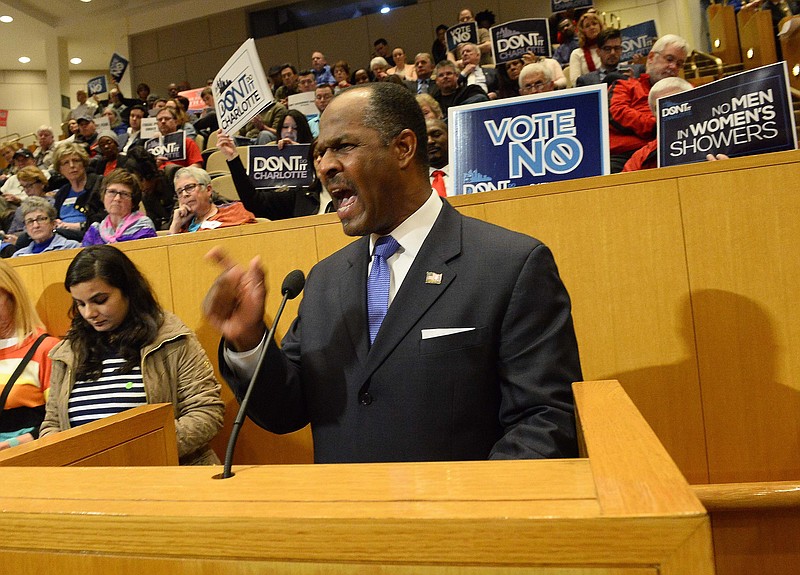The Charlotte City Council voted 7-4 Monday to add sexual orientation, gender identity and marital status as attributes protected from discrimination when it comes to public accommodations including restaurants, retail stores and other businesses. Public schools would not be affected by the law, which would take effect April 1.
"I'm pleased that Charlotte has sent a signal that we will treat people with dignity and respect, even when we disagree," Charlotte Mayor Jennifer Roberts said moments after the vote.
The Charlotte measure broadly defines how businesses must treat gay, lesbian and transgender customers, but as in other cities recently, the debate has focused on bathrooms.
One key legislative leader signaled Tuesday that he is prepared to intervene. House Speaker Tim Moore said in a statement he would join fellow Republican Gov. Pat McCrory and conservative colleagues "in exploring legislative intervention to correct this radical course." The legislature's next scheduled session begins in late April.
McCrory - a former mayor of Charlotte, one of the 20 largest cities in the U.S. - said changing restroom rules could "create major public safety issues."
"Also, this action of allowing a person with male anatomy, for example, to use a female restroom or locker room will most likely cause immediate state legislative intervention which I would support as governor," he wrote Sunday in an email to two Council members.
Since a similar anti-discrimination ordinance approved by Houston's city council was overturned in a voter referendum last year after opponents raised fears about bathroom safety, this line of attack has been used repeatedly around the country. In South Dakota, where the legislature passed a bill requiring students to use bathrooms corresponding to their sex at birth, transgender activists were lobbying the governor on Tuesday night to sign it.
In North Carolina, the advocacy group Equality NC criticized McCrory for "perpetuating the same tired and debunked myths about transgender people and public safety." The statement from executive director Chris Sgro accuses the governor and legislators of trying "to bully the Charlotte City Council with threats to strip municipalities of their rights to govern."
About 140 members of the public got one minute each to offer their opinions before Monday's vote. The council chambers were filled to capacity, and some speakers had to await their time outside.
Among them was Tami Fitzgerald, executive director of NC Values Coalition, who said "I applaud Gov. McCrory for having the sense to throw out this unreasonable and unnecessary ordinance."
Members of Charlotte's LGBT community said in a survey the changes are needed because they have been denied service, received poor service or experienced disparaging comments, according to supplemental materials attached to Monday's Council agenda. Opponents- including some clergy and business owners -sent the Council a letter asserting that businesses should have the right to refuse service based on sexual orientation or gender identity.
Research by the council's staff cited some residents' concerns that sexual predators would use the ordinance to gain entry to women's restrooms for assault or indecent exposure, but the researchers also said they had not found any evidence of such crimes increasing in cities with such ordinances.
Several hundred people stood outside in a wind-driven rain to protest, holding signs saying "No Men In Women's Restrooms" and "Keep Kids Safe."
Chris Williams, a 30-year-old father of three, passed out "No" stickers to the crowd, saying most Charlotte residents "stand with religious values."
"I don't want my kids having to even question, 'Why is there this person in the restroom?'" he said. "I don't think they should even be faced with that question and that concern."
A similar measure was narrowly defeated by the Charlotte City Council in March 2015, even after the bathroom provision was removed. Local officials later announced that in city- and county-owned facilities, transgender people could freely use bathrooms corresponding to their gender identity.

